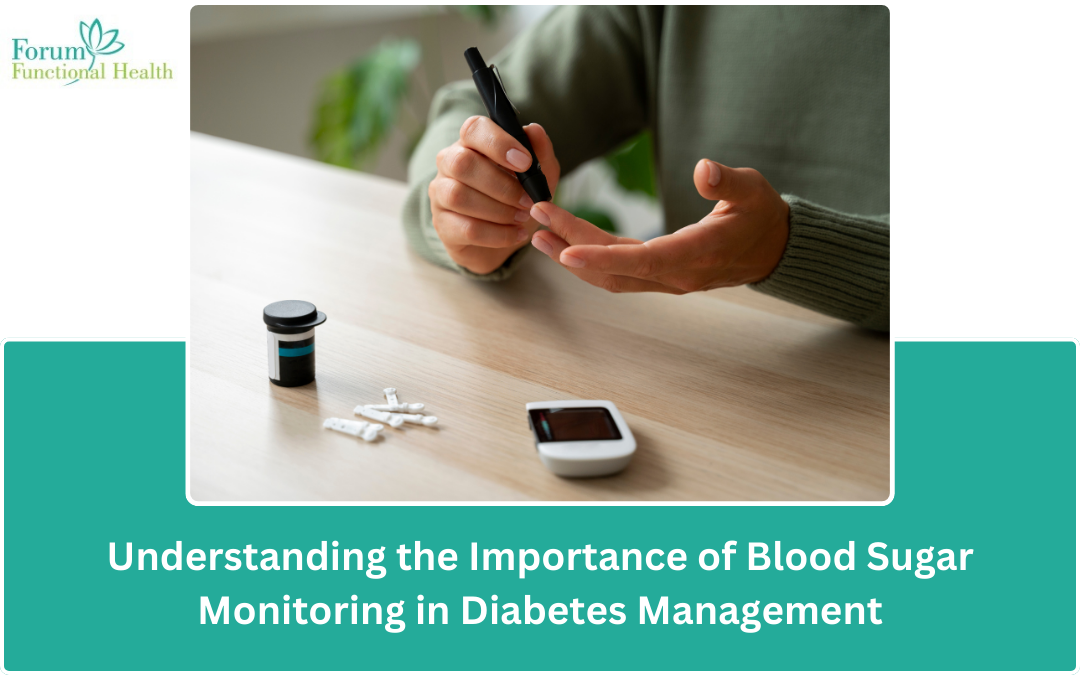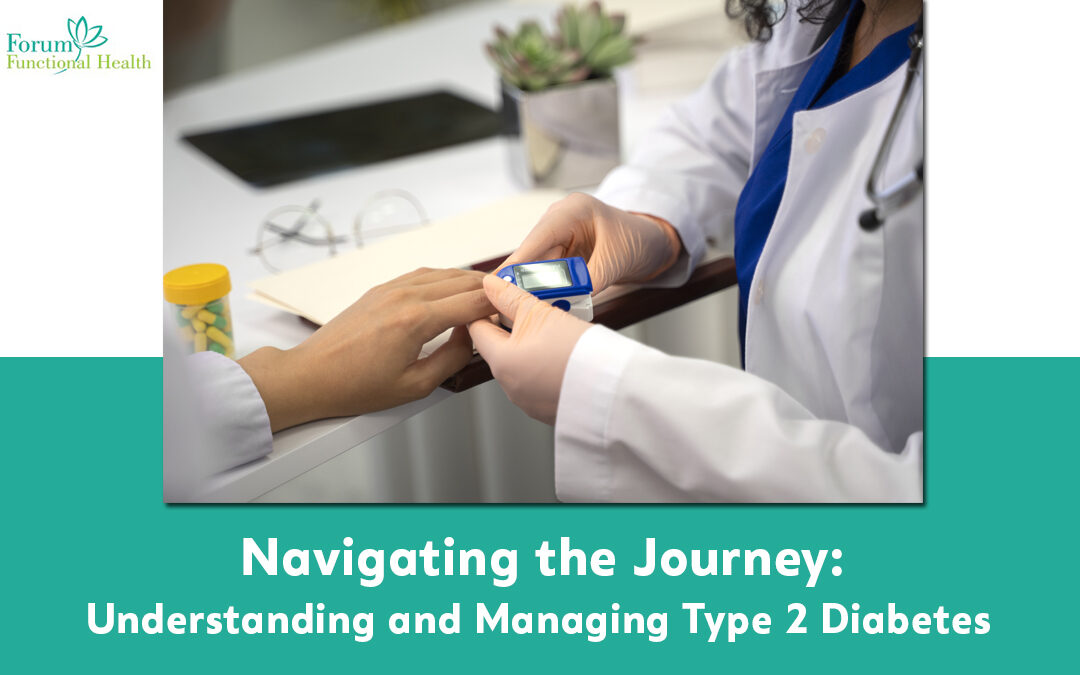Diabetes Management

by Forum Functional Health Center | Apr 9, 2024 | Diabetes Management
Sleep is often touted as one of the pillars of good health, alongside diet and exercise. But its importance goes beyond simply feeling refreshed in the morning. Emerging research has shed light on the intricate relationship between sleep and various aspects of health, including its significant impact on diabetes management. In this comprehensive guide, we’ll delve into the connections between sleep and diabetes, exploring how quality rest can influence blood sugar control and overall well-being.
Understanding the Link Between Sleep and Diabetes
Type 2 diabetes is a chronic condition characterized by elevated levels of blood sugar, resulting from insulin resistance or inadequate insulin production. Poor sleep patterns, such as short sleep duration, fragmented sleep, or sleep disorders like sleep apnea, have been consistently associated with an increased risk of developing type 2 diabetes. Furthermore, for individuals already living with diabetes, insufficient sleep can exacerbate symptoms and make blood sugar management more challenging.
The Impact of Sleep Deprivation on Blood Sugar Control
Several mechanisms contribute to the detrimental effects of sleep deprivation on blood sugar regulation. One key factor is insulin sensitivity. Sleep deprivation can lead to decreased insulin sensitivity, making it more difficult for cells to respond to insulin and allowing blood sugar levels to rise. Additionally, inadequate sleep disrupts the body’s circadian rhythm, affecting hormone levels and metabolic processes involved in glucose metabolism.
The Role of Sleep Quality in Diabetes Management
It’s not just about the quantity of sleep but also the quality. Restorative sleep is essential for maintaining optimal health and supporting various physiological functions, including glucose regulation. Research suggests that individuals with diabetes who experience better sleep quality tend to have improved glycemic control compared to those with poor sleep quality. Quality sleep promotes hormonal balance, reduces stress levels, and supports overall metabolic health, all of which are crucial for managing diabetes effectively.
Strategies for Improving Sleep in Diabetes Management
Given the significant impact of sleep on diabetes management, prioritizing good sleep hygiene is paramount. Here are some strategies to enhance sleep quality and support better blood sugar control:
Establish a consistent sleep schedule: Going to bed and waking up at the same time every day helps regulate the body’s internal clock and promote better sleep patterns.
Create a relaxing bedtime routine: Engage in calming activities before bedtime, such as reading, meditating, or taking a warm bath, to signal to your body that it’s time to wind down.
Create a comfortable sleep environment: Keep your bedroom dark, quiet, and cool to optimize conditions for sleep.
Limit screen time before bed: Exposure to blue light from electronic devices can interfere with melatonin production and disrupt sleep. Avoid screens at least an hour before bedtime.
Manage stress: Practice stress-reduction techniques such as deep breathing, yoga, or mindfulness meditation to promote relaxation and improve sleep quality.
Forum Functional Health Care: Empowering Patients for Better Health
At Forum Functional Health Care, we recognize the crucial role of sleep in overall health and wellness, particularly for individuals managing chronic conditions like diabetes. Our integrated approach to healthcare focuses on addressing the root causes of health issues, including sleep disturbances, to optimize patient outcomes.
Through personalized treatment plans tailored to individual needs, we empower patients to take control of their health and make sustainable lifestyle changes. Our team of healthcare professionals collaborates closely with patients to provide comprehensive support, including guidance on sleep hygiene, nutritional counseling, and stress management techniques.
By addressing sleep as a fundamental aspect of diabetes management, we aim to improve not only blood sugar control but also quality of life for our patients. Together, we work towards achieving optimal health and vitality, one good night’s sleep at a time. If you’re ready to prioritize sleep and enhance your diabetes management, contact Forum Functional Health Care today to schedule a consultation.
Read More:- Understanding ADHD in Children: A Comprehensive Guide to Symptoms, Causes, and Treatment

by Forum Functional Health Center | Mar 6, 2024 | Diabetes Management
Living with diabetes demands constant vigilance and management. Among the myriad of responsibilities, monitoring blood sugar levels stands out as a cornerstone of effective diabetes care. Whether you’re newly diagnosed or a seasoned veteran in managing your condition, understanding the significance of blood sugar monitoring is paramount. In this comprehensive guide, we’ll delve into the intricacies of blood sugar monitoring, its impact on Diabetes Management, and how it empowers individuals to take control of their health.
Why Blood Sugar Monitoring Matters in Diabetes Management
Blood sugar monitoring, also known as glucose monitoring, involves regularly measuring the concentration of glucose in your bloodstream. For individuals with diabetes, this practice is essential as it provides invaluable insights into how the body processes glucose, the primary energy source. By monitoring blood sugar levels, individuals can:
Maintain Glycemic Control: Consistently high blood sugar levels (hyperglycemia) can lead to a myriad of complications such as cardiovascular diseases, neuropathy, and kidney damage. Conversely, low blood sugar levels (hypoglycemia) can cause dizziness, confusion, and in severe cases, loss of consciousness. Regular monitoring allows individuals to adjust their treatment regimen, including medication dosage and dietary choices, to maintain optimal glycemic control.
Prevent Diabetes Complications: Diabetes is a complex condition that affects multiple organ systems in the body. Monitoring blood sugar levels helps identify fluctuations that may contribute to long-term complications such as diabetic retinopathy, neuropathy, and cardiovascular disease. By staying proactive and vigilant, individuals can mitigate the risk of developing these debilitating complications.
Inform Treatment Decisions: Diabetes management is highly individualized, and what works for one person may not be suitable for another. Blood sugar monitoring provides actionable data that healthcare providers can use to tailor treatment plans according to each individual’s needs. Whether it’s adjusting medication, fine-tuning insulin doses, or recommending lifestyle modifications, informed decisions based on blood sugar data are key to optimizing treatment outcomes.
Empower Self-Management: Diabetes is a lifelong condition that requires active participation from the individual. By incorporating blood sugar monitoring into their daily routine, individuals gain a deeper understanding of how their lifestyle choices impact their health. This awareness empowers them to make informed decisions regarding diet, exercise, and stress management, ultimately leading to better long-term health outcomes.
Practical Tips for Effective Blood Sugar Monitoring
Now that we’ve established the importance of blood sugar monitoring, let’s explore some practical tips to ensure its effectiveness:
Choose the Right Monitoring Device: With advancements in technology, there is a wide array of blood glucose monitoring devices available on the market, ranging from traditional glucometers to continuous glucose monitors (CGMs). Work with your healthcare provider to select the device that best suits your needs and lifestyle.
Establish a Monitoring Routine: Consistency is key when it comes to blood sugar monitoring. Set a schedule for checking your blood sugar levels, taking into account factors such as meal times, physical activity, and medication dosing. Incorporate monitoring into your daily routine to make it a habit.
Keep Detailed Records: Maintain a logbook or use digital apps to record your blood sugar readings, along with relevant information such as meal times, exercise, medication dosage, and any symptoms you may experience. This data provides valuable insights for both you and your healthcare provider to identify patterns and make informed adjustments to your treatment plan.
Stay Educated: Keep abreast of the latest developments in diabetes management and blood sugar monitoring techniques. Attend educational workshops, read reputable sources, and engage with online communities to learn from others’ experiences and stay motivated on your journey.
Forum Functional Health Care Integration
Incorporating blood sugar monitoring into the broader framework of functional healthcare is essential for providing comprehensive diabetes management. Functional healthcare emphasizes a holistic approach that addresses the root causes of illness, rather than simply managing symptoms. By integrating blood sugar monitoring into Forum Functional healthcare practices, healthcare providers can offer personalized, patient-centered care that empowers individuals to take control of their health.
Forum Functional Healthcare places a strong emphasis on patient education and empowerment. Through personalized coaching, nutritional guidance, and lifestyle interventions, individuals are equipped with the knowledge and skills to make informed decisions about their health. Blood sugar monitoring becomes not just a routine task, but a powerful tool for self-awareness and proactive management of diabetes.
Blood sugar monitoring plays a pivotal role in diabetes management, offering invaluable insights into metabolic health and guiding personalized treatment strategies. By integrating blood sugar monitoring into the framework of functional healthcare, we can offer individuals with diabetes comprehensive support that addresses their unique needs and empowers them to live vibrant, healthy lives.
By embracing a holistic approach that prioritizes education, empowerment, and personalized care, we can revolutionize diabetes management and improve outcomes for individuals living with this chronic condition.

by Forum Functional Health Center | Feb 6, 2024 | Diabetes Management
Living with Type 2 diabetes can be challenging, but with a clear understanding and effective management strategies, one can navigate this journey with confidence and improved well-being. This blog aims to simplify the complexities surrounding Type 2 diabetes, offering easy-to-follow advice and practical tips for individuals looking to take control of their health.
Understanding Type 2 Diabetes
At its core, Type 2 diabetes is a metabolic disorder characterized by insulin resistance and high blood sugar levels. It often develops in adulthood, and lifestyle factors such as diet and physical activity play a crucial role in its onset and progression.
The journey begins with understanding the factors that contribute to Type 2 diabetes. Simplifying the science, insulin, a hormone produced by the pancreas, helps regulate blood sugar. In Type 2 diabetes, the body becomes resistant to the effects of insulin, leading to elevated blood sugar levels. Genetics, sedentary lifestyles, and poor dietary choices can contribute to this insulin resistance.
Breaking Down the Basics
Managing Type 2 diabetes starts with education. It’s essential to grasp the basics of how food choices impact blood sugar levels. Carbohydrates, especially sugars and starches, have a direct effect on blood glucose. Monitoring and moderating carbohydrate intake are fundamental aspects of managing diabetes.
A balanced diet that includes whole grains, lean proteins, fruits, and vegetables is key. Portion control and mindful eating can help regulate blood sugar levels. Small, frequent meals spread throughout the day can prevent sharp spikes and crashes in blood sugar.
The Role of Physical Activity
Regular exercise is a cornerstone in managing Type 2 diabetes. Physical activity helps improve insulin sensitivity, allowing cells to use glucose more effectively. It also aids in weight management and contributes to an overall sense of well-being.
Exercise doesn’t have to be strenuous. Even a brisk walk, cycling, or swimming for 30 minutes a day can make a significant difference. Finding activities that bring joy and can be incorporated into daily life is essential for long-term adherence.
Mindful Living for Diabetes Management
Beyond diet and exercise, the mind plays a crucial role in managing Type 2 diabetes. Stress can elevate blood sugar levels, so incorporating stress-reducing activities such as meditation, deep breathing, or yoga is beneficial.
Regular monitoring of blood sugar levels is another essential aspect. Understanding how different foods and activities impact blood glucose empowers individuals to make informed choices. This self-awareness is a valuable tool in diabetes management.
Building a Support System
Navigating the Type 2 diabetes journey doesn’t have to be a solitary endeavor. Building a support system of friends, family, and healthcare professionals is vital. Sharing experiences, seeking advice, and having a reliable network can provide emotional support and practical insights.
Regular check-ups with healthcare providers are essential for monitoring overall health and addressing any concerns promptly. Medication management, if prescribed, should be followed diligently, and any side effects or concerns should be communicated to healthcare professionals.
Celebrating Small Victories
Managing Type 2 diabetes is a continuous journey with ups and downs. Celebrating small victories, whether it’s achieving a fitness goal, maintaining stable blood sugar levels, or making positive lifestyle changes, is crucial for motivation and sustained effort.
Setting realistic goals and acknowledging progress fosters a positive mind-set. Each step towards better health is an achievement worth recognizing, creating a sense of empowerment and control over one’s well-being.
Understanding and managing Type 2 diabetes is a multifaceted journey that involves lifestyle changes, education, and a supportive network. By breaking down the complexities into manageable steps, individuals can take charge of their health and embrace a fulfilling life despite diabetes.
Forum Functional Health Care takes a comprehensive approach to Type 2 diabetes management, acknowledging that it is a complicated journey requiring more than simply medicine and testing. We believe in empowering people via lifestyle changes and promoting a thorough understanding of their health.
Our community support system is intended to create a network for folks started on this adventure. We hope to foster a supportive environment in which members may learn from one another by sharing our experiences, knowledge, and encouragement. We recognize the need of a holistic approach that considers physical, mental, and emotional well-being.



